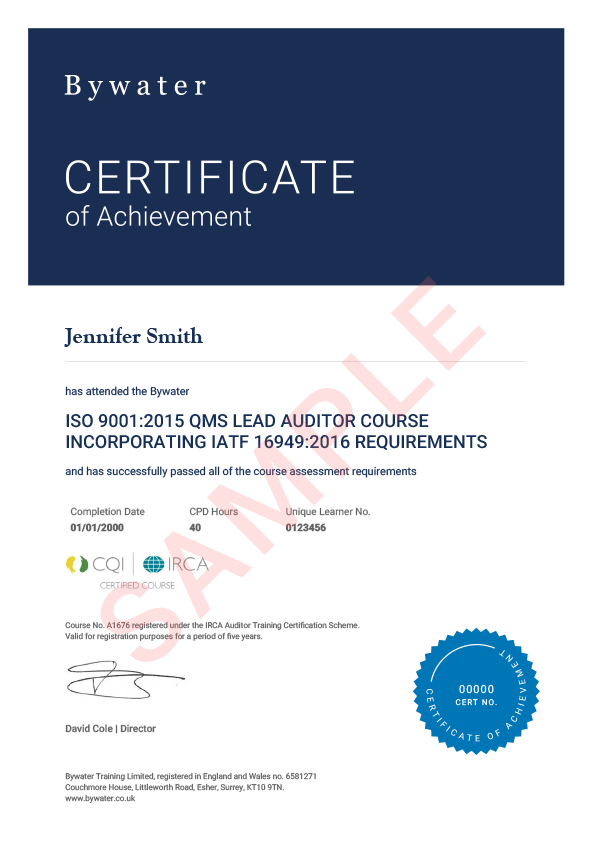IATF 16949 Lead Auditor Training Course
DURATION
5 daysCPD
Equivalent to 40 hoursCERTIFICATES
All delegates will receive a certificate on completion.DELIVERY OPTIONS
Course certification

CQI and IRCA certified QMS Lead Auditor training course, incorporating IATF 16949:2016 requirements for the automotive industry. Course ID: 1675
This highly interactive and practical 5-day course draws on a central case study to support learning, while making full use of workshops and roles plays across a wide range of topics, including quality management standards, audit situations, and preparing nonconformity statements.
At the end of the course delegates will have the knowledge and skills to assess an organisation’s quality management system compliance against IATF 16949 and ISO 9001 and contribute to continuous improvement programmes.
Click to open the IATF 16949 Lead Auditor course flyer.
- those who will be involved in conducting 1st, 2nd and/or 3rd party audits against IATF 16949 within the automotive sector
- those responsible for obtaining 3rd party certification to IATF 16949 for their organisation
- individuals who wish to become CQI and IRCA registered lead auditors
- senior managers who will have to evaluate the outcome of internal quality management system (QMS) audits and who have responsibility/authority to improve the effectiveness of the QMS
- auditors in other sectors who now wish to audit within the automotive sector
Please note that familiarity with IATF 16949 and ISO 9001 is necessary for a full understanding of the principles developed in this course. Click to learn more about prior knowledge requirements and test your knowledge.
Some delegates find it beneficial to attend the Understanding IATF 16949 training course to gain more knowledge about the IATF 16949 standard. We offer a discount of £100 when booking this course with this lead auditor training course. Please contact us if you wish to take advantage of this offer.
- quality management standards (ISO 9000, ISO 9001 and IATF 16949)
- core tools: advanced product quality planning (APQP), failure mode and effects analysis (FMEA), material failure analysis (MSA), product part approval process (PPAP) and statistical process control (SPC)
- 1st, 2nd and 3rd party audits
- documented systems
- audit planning, including audit scope and audit strategy
- the role of an auditor and auditing techniques
- audit checklists
- opening and closing meetings
- nonconformity writing
- audit reports and audit records
- follow-up and corrective action
- accreditation and certification activities
- sources of information and further development
To make the most of your training investment, expect full days with breaks and evening assignments.
- Day 1
- Module 1 Welcome and Introduction
- Module 2 Quality and Quality Assurance
- Module 3 Workshop: The Wedding
- Module 4 Audit Overview
- Module 5 Quality Management Standards
- LUNCH
- Module 6 Workshop: Audit Situations
- Module 7 Documented Systems
- Module 8 Workshop: Quality System Documentation Review
- CLOSE
- Day 2
- Module 9 Audit Planning
- Module 10 Workshop: Audit Planning
- Module 11 Checklists
- Module 12 Workshop: Preparing Checklists
- LUNCH
- Module 13 Opening Meetings
- Module 14 Workshop: Conducting Opening Meetings
- Module 15 Auditing Techniques – Interviewing and Questioning
- Module 16 Audit Case Study 1 – Part 1
- Module 17 Workshop: Nonconformity Writing
- Module 18 Audit Case Study 1 – Part 2
- Module 19 Introduction to Exam – Part 1
- CLOSE
- Day 3
- Module 20 Auditing Techniques – Note Taking and Sampling
- Module 21 Workshop: Auditing Techniques
- LUNCH
- Module 22 Nonconformity Writing
- Module 23 Workshop: Preparing Nonconformity Statements
- Module 24 Audit Case Study 2 – Part 1
- Module 25 Audit Case Study 2 – Part 2
- CLOSE
- Day 4
- Module 26 Introduction to Exam – Part 2
- Module 27 Closing Meetings
- Module 28 Reporting
- LUNCH
- Module 29 Workshop: Closing Meeting
- Module 30 Follow-up and Corrective Action
- Module 31 Review of Specimen Exam Paper
- CLOSE
- Day 5
- Module 32 Audit Summary Report
- Module 33 First, Second and Third-Party Auditing
- Module 34 Workshop: Corrective Action
- Module 35 IRCA – Requirements for Registration
- Q&A Session
- Introduction to Examination
- Examination
- Course Review and Evaluation
- CLOSE
- apply the requirements and principles of ISO 9001 and identify the relationship between ISO 9001 and the additional requirements of IATF 16949, together with the supporting core tools
- assess compliance of an organisation to meet their company’s own internal or external requirements
- conduct audits to professional criteria with confidence, gathering objective evidence through observation, interviewing and document trails to provide factual audit reports that will facilitate continuous improvements to the quality management system
- develop their own skills, techniques and competence as an auditor
Successful completion of the course enables students to meet the training requirements for registration as a QMS Lead Auditor under the CQI and IRCA Auditor Registration Scheme.
Assessment is by continual assessment and an examination on the final day.

Upcoming course dates










Lead auditors have the skills to conduct and lead audits within their own and other organisations, such as partners and suppliers.
Internal auditors focus specifically on auditing processes and systems within their own organisations.
Bywater’s lead auditor training takes you through the concepts and practical application of the IATF 16949 standard to enable you to work as a lead auditor. If you need to understand how to audit a quality management system in 1st, 2nd or 3rd party organisations, we recommend this IATF 16949 Lead Auditor training course.
If your focus is solely on performing internal audits of your organisation’s quality management system against IATF 16949, then our Internal Auditor training will be the best choice for you.
Receiving training from a certified training provider demonstrates that you have learned new skills from an organisation that is officially approved by the relevant standards organisation.
This gives reassurance to your employer that you have gained sound and up-to-date knowledge that can be applied effectively within your organisation to help continually improve processes and systems.
Completing a certified training course also demonstrates to your current and future employer that you have valuable skills and an ongoing commitment to personal development. You can add your certificate to your CV, LinkedIn profile and other platforms to share your achievement.
As an established and independent Approved Training Partner of CQI (Chartered Quality Institute) and IRCA (International Register of Certificated Auditors), we offer training courses that are certified by the recognised global professional body for auditors.
We deliver expert training at a time and place to suit you. Today we run more than 1000 scheduled courses a year, both face-to-face and in our Virtual Classroom. Or if you prefer, we can provide dedicated, in-company training just for your organisation.
Because all our classes are live, you benefit from group work and discussion, and can ask for help from your tutor as the course progresses. Your tutor will have the expertise and experience to be able to guide you through real-world situations and challenges.
We invite every delegate to let us know if the training met their expectations, or what they would like to see change. We are committed to building on feedback to improve our service and performance, to help you achieve your business goals.
Customer reviews
Sumika Polymer Compounds (UK) Ltd|9th Jul, 2025
Gac Services (Uk) Ltd|8th Jul, 2025
Sumika Polymer Compounds (UK) Ltd|8th Jul, 2025
Portsmouth City Council|27th Jun, 2025
Babcock International Group|27th Jun, 2025
Virtual Signature Idv Limited (T/A Vsid)|26th Jun, 2025
Capalex|19th Jun, 2025
Capita|17th Jun, 2025
Tetra Consulting Ltd|12th Jun, 2025
Metocean Telematics UK|9th Jun, 2025
Workman Llp|9th Jun, 2025
Masonry Support Systems Limited|6th Jun, 2025

